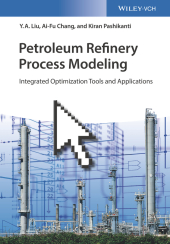 Neuerscheinungen 2018Stand: 2020-02-01 |
Schnellsuche
ISBN/Stichwort/Autor
|
Herderstraße 10
10625 Berlin
Tel.: 030 315 714 16
Fax 030 315 714 14
info@buchspektrum.de |

Ai-Fu Chang, Y. A. Liu, Kiran Pashikanti
(Beteiligte)
Petroleum Refinery Process Modeling
Integrated Optimization Tools and Applications
1. Auflage. 2018. XXVIII, 571 S. 723 SW-Abb. 244 mm
Verlag/Jahr: WILEY-VCH 2018
ISBN: 3-527-34423-3 (3527344233)
Neue ISBN: 978-3-527-34423-9 (9783527344239)
Preis und Lieferzeit: Bitte klicken
A comprehensive review of the theory and practice of the simulation and optimization of the petroleum refining processes
Petroleum Refinery Process Modeling offers a thorough review of how to quantitatively model key refinery reaction and fractionation processes. The text introduces the basics of dealing with the thermodynamics and physical property predictions of hydrocarbon components in the context of process modeling. The authors - three experts on the topic - outline the procedures and include the key data required for building reaction and fractionation models with commercial software.
The text shows how to filter through the extensive data available at the refinery and using plant data to begin calibrating available models and extend the models to include key fractionation sub-models. It provides a sound and informed basis to understand and exploit plant phenomena to improve yield, consistency, and performance. In addition, the authors offer information on applying models in an overall refinery context through refinery planning based on linear programming. This important resource:
-Offers the basic information of thermodynamics and physical property predictions of hydrocarbon components in the context of process modeling
-Uses the key concepts of fractionation lumps and physical properties to develop detailed models and workflows for atmospheric (CDU) and vacuum (VDU) distillation units
-Discusses modeling FCC, catalytic reforming and hydroprocessing units
Written for chemical engineers, process engineers, and engineers for measurement and control, this resource explores the advanced simulation tools and techniques that are available to support experienced and aid new operators and engineers.
Y.A. Liu, the Alumni Distinguised Professor and the Frank C. Vilbrandt Endowed Professor of Chemical Engineering at Virginia Tech, received his B.S. (1967), M.S. (1970), and Ph.D. (1974) degrees from National Taiwan University, Tufts University and Princeton University, respectively. Professor Liu devoted his school breaks helping petrochemical industries in developing countries and chemical industries in Virginia with technology development and engineering training. He has taught intensive training courses on computer-aided design, advanced process control, energy and water savings, and refinery and polymerization process modeling to over 7,000 practicing engineers in China, Taiwan and United States. Ai-Fu Chang received his Ph.D. in the Department of Chemical Engineering at Virginia Polytechnic Institute and State University (Virginia Tech) in September, 2011. He received his B.S. in chemical engineering from National Taiwan University in 2001. He completed his doctoral dissertation on integrated process modeling and product design of biodiesel manufacturing, and refinery reaction and fraction systems. The latter was the basis of this textbook. He has worked on several industrial modeling projects, including poly (acrylonitrile-vinyl acetate), hydrocracking, and biodiesel. These projects were collaborative efforts between Virginia Tech, Aspen Technology, and industrial manufacturers. He is currently employed by Chevron Phillips Chemical Company. Kiran Pashikanti was a PhD student in the Department of Chemical Engineering at Virginia Tech. He received his B.S. in chemical engineering from Virginia Commonwealth University in 2005, and his Ph.D. in chemical engineering from Virginia Tech in September, 2011. He has worked on several industrial modeling projects on integrated modeling of refinery reaction and fraction systems, and of carbon-dioxide capture processes. This textbook grows out of his doctoral dissertation on the predictive modeling of fluid catalytic cracking (FCC) and catalytic reforming processes. He is currently employed by Chevron Phillips Chemical Company.


